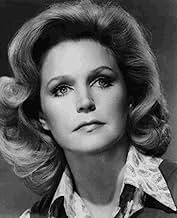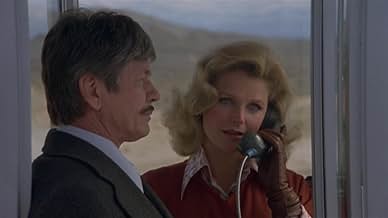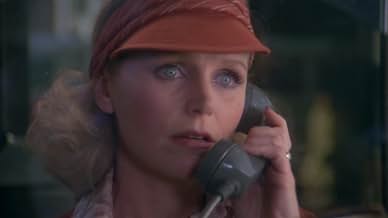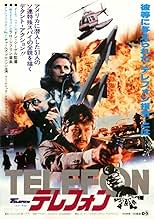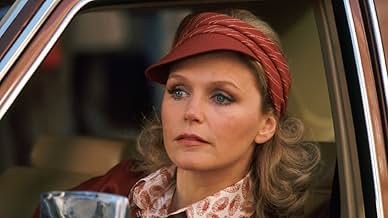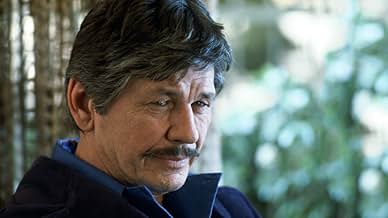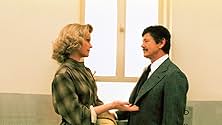PUNTUACIÓN EN IMDb
6,5/10
6,6 mil
TU PUNTUACIÓN
Un oficial ruso es enviado a EE. UU. Para intentar detener a agentes inactivos que atacarán inconscientemente organismos gubernamentales cuando escuchen ciertas palabras codificadas.Un oficial ruso es enviado a EE. UU. Para intentar detener a agentes inactivos que atacarán inconscientemente organismos gubernamentales cuando escuchen ciertas palabras codificadas.Un oficial ruso es enviado a EE. UU. Para intentar detener a agentes inactivos que atacarán inconscientemente organismos gubernamentales cuando escuchen ciertas palabras codificadas.
- Dirección
- Guión
- Reparto principal
- Premios
- 1 nominación en total
Regis Cordic
- Doctor
- (as Regis J. Cordic)
Reseñas destacadas
Riveting political thriller. Bronson plays a Russian intelligence major assigned to stop programmed Stalinist agents from carrying out a possible doomsday plan. Bronson's a member of a reformist wing of the Soviet Communist Party that has replaced hardline Stalinists. However, the earlier doomsday plan remains in effect, and now it's being executed in the US by a renegade Soviet agent (Pleasance). Fortunately for Bronson, the winsome Remick is assigned by Soviets to assist him. Problem is if Pleasance is not stopped he could well set off a nuclear catastrophe.
The movie has two elements from earlier Cold War films: The Manchurian Candidate (1962) and Dr. Strangelove (1964). Like Laurence Harvey in the former, agents here are programmed by trigger words to carry out their mission in robotic fashion. At the same time, there's the overhang of a possible doomsday as in Strangelove. Here those elements are skillfully blended to build suspense.
What really distinguishes the film, however, is an overall absence of Cold War good guys and bad guys. There's really only one villain, the unreformed Stalinist. Unlike 50's Cold War films, this one treats operatives of both sides strictly as professionals doing their duty without noticeable favorites. One possible exception is Remick. Despite her coy girlish manner, she's also been assigned to eliminate partner Bronson once he succeeds in killing Pleasance. That way, no one will be left to spill the beans about the aborted plan and embarrass the new Soviet regime. So Bronson is to be rewarded by his superiors with death. Maybe that's a good enough reason, but not unarguably so.
Meanwhile, Bronson's his usual steely self, while Remick plays up the girlish appearance, leaving us to guess how much of a façade it is. But stealing the show is Tyne Daly as the plain-looking brain behind the American side. Her superiors appear rather addled much of the time, while she deftly maneuvers clues behind her bank of computers. Good touch. Most of the action comes from explosions that blow up real good. I don't know how they did them in 1977, but they're impressive as heck.
Anyway, the movie suggests a possible waning of Cold War passions on our side, perhaps because of growing recognition of what a nuclear exchange would entail. Be that as it may, the movie remains a taut and under-rated political thriller, helmed by the masterful Don Siegel.
The movie has two elements from earlier Cold War films: The Manchurian Candidate (1962) and Dr. Strangelove (1964). Like Laurence Harvey in the former, agents here are programmed by trigger words to carry out their mission in robotic fashion. At the same time, there's the overhang of a possible doomsday as in Strangelove. Here those elements are skillfully blended to build suspense.
What really distinguishes the film, however, is an overall absence of Cold War good guys and bad guys. There's really only one villain, the unreformed Stalinist. Unlike 50's Cold War films, this one treats operatives of both sides strictly as professionals doing their duty without noticeable favorites. One possible exception is Remick. Despite her coy girlish manner, she's also been assigned to eliminate partner Bronson once he succeeds in killing Pleasance. That way, no one will be left to spill the beans about the aborted plan and embarrass the new Soviet regime. So Bronson is to be rewarded by his superiors with death. Maybe that's a good enough reason, but not unarguably so.
Meanwhile, Bronson's his usual steely self, while Remick plays up the girlish appearance, leaving us to guess how much of a façade it is. But stealing the show is Tyne Daly as the plain-looking brain behind the American side. Her superiors appear rather addled much of the time, while she deftly maneuvers clues behind her bank of computers. Good touch. Most of the action comes from explosions that blow up real good. I don't know how they did them in 1977, but they're impressive as heck.
Anyway, the movie suggests a possible waning of Cold War passions on our side, perhaps because of growing recognition of what a nuclear exchange would entail. Be that as it may, the movie remains a taut and under-rated political thriller, helmed by the masterful Don Siegel.
I was never a big Charles Bronson fan. His movies usually followed the same predictable patterns of revenge and violence with Bronson usually coming off dry and stiff. His performances were usually always one note.
Of the few films of his I have enjoyed (see also "The Mechanic" and "Hard Times") from that era, "Telefon is a surprisingly gripping thriller even though the story is downright silly at times. Bronson plays (and doesn't even begin to resemble) a KGB agent out to track a killer who have been brainwashed. One call from this guy and the reciting of some lines from a Frost poem and that person is hypnotized into going out and committing an act of violence that resembles terrorism in many cases. Donald Pleasance convincingly plays the bad guy and that, I think, is what makes the movie work. Pleasance is credible in the role, thus we fear him and route for Bronson to catch him. Also on hand is Lee Remick as an American agent assigned to help Bronson but who also has a hidden agenda of her own.
Director Don Seigel handles the silly material in a straightforward manner never taking things too seriously. Bronson is less stiff then usual and the action scenes are well done. The ending is a bit abrupt but that is minor nit picking. It's a silly thriller I enjoyed and, if you are a Bronson fan, I am sure you will enjoy it too.
Of the few films of his I have enjoyed (see also "The Mechanic" and "Hard Times") from that era, "Telefon is a surprisingly gripping thriller even though the story is downright silly at times. Bronson plays (and doesn't even begin to resemble) a KGB agent out to track a killer who have been brainwashed. One call from this guy and the reciting of some lines from a Frost poem and that person is hypnotized into going out and committing an act of violence that resembles terrorism in many cases. Donald Pleasance convincingly plays the bad guy and that, I think, is what makes the movie work. Pleasance is credible in the role, thus we fear him and route for Bronson to catch him. Also on hand is Lee Remick as an American agent assigned to help Bronson but who also has a hidden agenda of her own.
Director Don Seigel handles the silly material in a straightforward manner never taking things too seriously. Bronson is less stiff then usual and the action scenes are well done. The ending is a bit abrupt but that is minor nit picking. It's a silly thriller I enjoyed and, if you are a Bronson fan, I am sure you will enjoy it too.
One effect of watching this one is that you will always read Frost's "Stopping By Woods" from a very different point of view.
No question, there's a whole lot of good acting in Don Siegel's "Telefon" (from Tyne Daly, for instance), but the story, from Walter Wager's novel, is, at least partly, ridiculous. Criticism of international secret policy comes off o.k., claiming that what intelligence agencies have always lacked most is intelligence. But it's more about suspense and action; especially the blowing up of a whole valley is staged with Siegel's dynamic perfection routine.
The film has got Charles Bronson in its center and he does his usual fine job as an ultra-cool Soviet major smuggled into the U.S. in order to exterminate a fellow KGB agent (Donald Pleasence) who has gone crazy there and is now endangering the whole Cold War balance system.
Please note the important rôle telephones play throughout the whole film, not just for Pleasence's ambitions. And watch out for Roy Jenson as his last victim, a man who has played lots of minor parts in major movies. - And don't forget listen to the film, as Lalo Schifrin's score is very fascinating once again.
No question, there's a whole lot of good acting in Don Siegel's "Telefon" (from Tyne Daly, for instance), but the story, from Walter Wager's novel, is, at least partly, ridiculous. Criticism of international secret policy comes off o.k., claiming that what intelligence agencies have always lacked most is intelligence. But it's more about suspense and action; especially the blowing up of a whole valley is staged with Siegel's dynamic perfection routine.
The film has got Charles Bronson in its center and he does his usual fine job as an ultra-cool Soviet major smuggled into the U.S. in order to exterminate a fellow KGB agent (Donald Pleasence) who has gone crazy there and is now endangering the whole Cold War balance system.
Please note the important rôle telephones play throughout the whole film, not just for Pleasence's ambitions. And watch out for Roy Jenson as his last victim, a man who has played lots of minor parts in major movies. - And don't forget listen to the film, as Lalo Schifrin's score is very fascinating once again.
Telefon casts Charles Bronson as a KGB agent on assignment in America trying to stop Donald Pleasance from igniting World War III. Bronson is aided and abetted uneasily by CIA agent Lee Remick and the two of them get involved with each other as well as the mission at hand.
It's quite a mission they have, Pleasance is an old line Stalinist and he's noticed the new regime is slowly doing away with his kind. So he knows about this operation involving 51 Manchurian candidates who are Russian sleeper agents the way Laurence Harvey was in the Manchurian Candidate. With the proper phrase these people who are under hypnosis and just living regular humdrum lives get a signal to complete a mission involving sabotage of some military installation in their area. Pleasance has come to America to set these agents off.
It might have been a whole lot easier to just dial long distance once he was out of the Soviet Union, but apparently Pleasance is also getting a few jollies and really wants to see his handiwork. Bronson gets the list and follows Pleasance's trail hoping to head him off.
A nice cast of talented players pulls off and makes entertaining when you think about it, a really silly Cold War era story. Pleasance as usual pulls all the stops out as the villain and Bronson is his usual menacing self. His loyal legion of fans might like Telefon, I'm kind of partial to it myself, but I recognize it's illogicality.
It's quite a mission they have, Pleasance is an old line Stalinist and he's noticed the new regime is slowly doing away with his kind. So he knows about this operation involving 51 Manchurian candidates who are Russian sleeper agents the way Laurence Harvey was in the Manchurian Candidate. With the proper phrase these people who are under hypnosis and just living regular humdrum lives get a signal to complete a mission involving sabotage of some military installation in their area. Pleasance has come to America to set these agents off.
It might have been a whole lot easier to just dial long distance once he was out of the Soviet Union, but apparently Pleasance is also getting a few jollies and really wants to see his handiwork. Bronson gets the list and follows Pleasance's trail hoping to head him off.
A nice cast of talented players pulls off and makes entertaining when you think about it, a really silly Cold War era story. Pleasance as usual pulls all the stops out as the villain and Bronson is his usual menacing self. His loyal legion of fans might like Telefon, I'm kind of partial to it myself, but I recognize it's illogicality.
Bronson and Remick make an unusual, but intriguing pair in this cold war suspense drama. He plays a KGB agent (with a notable American accent, attributed to his many trips to the U.S.!) who is sent to eliminate a renegade Stalinist who is wreaking havoc on various American military/industrial sites. The renegade (Pleasence) has unearthed a 15 year-old plot that the Soviets had put into place and then abandoned in which 51 agents were brainwashed into believing that they were Americans, but who can be reactivated through verbal command to complete their missions. Once they hear the key phrase (usually delivered to them over the telephone, hence the title), they single-mindedly go about blowing up whatever target was originally intended and then offing themselves. Bronson joins forces with CIA operative Remick, giving her limited information about the mission, but using her resources to reach his ends. The film becomes a sort of cross-country chase as the agent couple fight to either catch up to or stay ahead of Pleasence before he sets off another dormant killing machine. Logic and believability often take a backseat here with the premise itself being a little hard to swallow. However, the acting of the leads and the eeriness of the situation go a long way to cover up the problems with the plot. Bronson is his usual rather silent, tough self, but it works, especially against the more animated and sophisticated Remick. Her character is not always particularly credible, but she adds tastefulness to any film and can always be counted on for good reactions (her eyes captured more light than practically anyone before or since, except maybe Meg Foster.) There are some other decent performances in the film (such as Magee as a weary Russian general) but one that grates is Daly as a know-it-all CIA computer technician. Meant to be comic relief, she winds up more of a distraction and a point of irritation during a lot of her scenes. Pleasence has few lines and isn't in the film a great deal, but manages to ham it up nonetheless with several unintentionally hilarious expressions and loopy disguises. Composer Schifrin provides an effective, Russian-tinged score for the film.
¿Sabías que...?
- CuriosidadesDirector Don Siegel asked Charles Bronson to shave his trademark mustache off for this movie. Bronson replied, "No mustache, no Bronson." Siegel said in his book 'A Siegel Film: An Autobiography', "I felt that as much as Bronson wore a heavy mustache in Russia, it would help his disguise if he had no mustache when he arrives in Canada. However he didn't want to shave it off."
- PifiasAll of the KGB characters shown in uniform at the beginning of the film are "out of uniform." Although Borzov, Bronson's character, and the others are clearly meant to be in the KGB, the uniforms they wear are trimmed in red, the color of the regular Soviet Army, not the KGB. During the era of the film KGB uniforms were trimmed in Royal Blue. Also, the uniforms in the film lack the distinctive "Sword and Shield" patch worn by KGB officers on their jacket and coat sleeves.
- Citas
Nicolai Dalchimsky: The woods are lovely, dark, and deep, but I have promises to keep. And miles to go before I sleep, and miles to go before I sleep. Remember. Miles to go before I sleep.
- ConexionesFeatured in 42nd Street Forever, Volume 3: Exploitation Explosion (2008)
- Banda sonoraThe Yellow Rose of Texas
(uncredited)
Traditional American folk melody
Selecciones populares
Inicia sesión para calificar y añadir a tu lista para recibir recomendaciones personalizadas
- How long is Telefon?Con tecnología de Alexa
Detalles
- Fecha de lanzamiento
- País de origen
- Idioma
- Títulos en diferentes países
- Telèfon
- Localizaciones del rodaje
- Helsinki, Finlandia(Moscow, Leningrad, Russia, ten days)
- Empresa productora
- Ver más compañías en los créditos en IMDbPro
Taquilla
- Presupuesto
- 7.000.000 US$ (estimación)
- Duración1 hora 42 minutos
- Mezcla de sonido
- Relación de aspecto
- 1.85 : 1
Contribuir a esta página
Sugerir un cambio o añadir el contenido que falta


